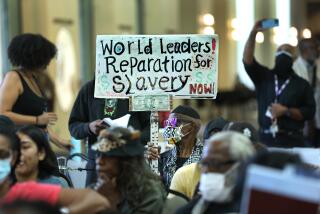Cochran Targets Major Firms in New Venture
- Share via
WASHINGTON — Johnnie L. Cochran Jr., who made his reputation as a criminal attorney defending celebrity clients such as O.J. Simpson and Sean “Puffy” Combs, announced Wednesday that he is opening an office here to take on class-action, personal injury lawsuits against major industries and government agencies.
Joining forces with a law firm in Washington that handled many Holocaust victims’ cases and another in Florida that was instrumental in tobacco litigation, Cochran promised a “consortium for justice” that would “comfort the afflicted and afflict the comfortable.”
In recent years, politically minded attorneys increasingly have teamed with personal injury lawyers interested in big-money, big-publicity cases to take on major companies--be it Microsoft or breast implant manufacturers.
One result is a sharing of information--and a collective strategy for using it.
“The asbestos litigation begat the tobacco litigation,” explained Ashley Taylor, a defense attorney who has argued cases for corporations. “The tobacco litigation will beget more litigation. The only question is, what industry is next?”
At a news conference, Cochran mentioned the nursing home industry as a potential target. And one of his new partners, Michael Hausfeld, said the group already is at work on a case against the tobacco companies for targeting advertising to children and young adults.
But perhaps most intriguing among the consortium’s plans is the effort to pursue slave reparations for black Americans, one case they say they will work on without fees.
Cochran has been meeting with other lawyers and academics for more than a year to discuss the legal and political strategy for pursuing reparations from the government and from corporations that, for example, offered slave insurance policies before the Civil War. Chaired by Harvard law professor Charles Ogletree and Randall Robinson, who two decades ago launched public protests against South Africa’s apartheid system, the team is researching corporate histories for possible liability and talking to Congress about possible legislative remedies.
Aware of the legal difficulty of proving any harmful effect on individual descendants of American slaves, Cochran said he instead is seeking “an education remedy,” providing additional resources to schools in predominantly black communities to erase the historic gap left by slavery. That option might be “more palatable to the majority community,” he said.
“Our goal is not for everybody to collect a check,” Cochran said.
Hausfeld--who brought action against Swiss bankers for seizing the assets of Holocaust victims and who now represents Russia and several Eastern European countries on issues of forced labor by the Nazis--thinks some of the same principles apply to the reparation case. “We’re looking at expanding the scope,” Hausfeld said. “Why keep the focus domestic? There were British shipping companies, Dutch and German banks.”
Hausfeld’s technical expertise, coupled with Cochran’s high profile, could propel the issue of reparations to new stature on Capitol Hill. Rep. John Conyers Jr. (D-Mich.) has been calling for hearings ever since Congress, in 1988, gave reparations to Japanese Americans for their imprisonment during World War II.
Any lawsuit could provide Cochran a chance to work the political angle to greater effect, given the public relations havoc a corporation accused of profiting from slavery would face.
“We’ve got to get into court, and Michael helps us with that,” Cochran said, referring to his new partner. “With regard to corporations and universities, it’s going to be different than dealing with the government. Maybe down the road some of them will want to fashion some kind of remedy. I really hope so. I would think that some of these corporations may be vulnerable.”
More to Read
Inside the business of entertainment
The Wide Shot brings you news, analysis and insights on everything from streaming wars to production — and what it all means for the future.
You may occasionally receive promotional content from the Los Angeles Times.










